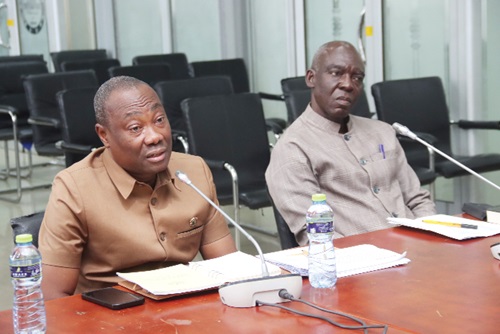The best way to deal with the illegal mining conundrum in the country is for the government to commit more resources to the Ghana Geological Survey Authority (GGSA) to carry out aggressive exploration for gold-rich lands and allocate them to small-scale miners," the Chief Executive Officer (CEO) of the Minerals Commission, Martin Ayisi, has suggested.
Mr Ayisi stressed that to ensure radical exploration and blocking out of the mineable lands in the 13 gold-rich regions, seasoned geologists registered with the Minerals Commission and other academic institutions must be brought on board to support the exploratory activities.
He said the failure of successive governments to invest in the exploration and blocking out of mineable lands for small-scale miners as recommended by the World Bank over three decades ago was the bane of the small-scale mining (SSM) sector.
"The fundamental cause of the galamsey menace is the failure in getting a place for the miners to work. Until we spend money to do exploration for gold by resourcing the GGSA, we are not going anywhere; we will continue to go round in circles," he stressed.
The Minerals Commission CEO stated this when he appeared before the Government Assurance Committee of Parliament in Accra yesterday.
He emphasised that while there were heightened calls by many Ghanaians to ban all forms of small-scale mining as a measure to deal with galamsey, making such a move would be a knee-jerk reaction as "99 per cent of the solution lies in geological exploration for mineable areas."
Proceedings
The proceedings were advertised to start at 10a.m., but as of 10:46 am only the Chairman of the Committee, Samuel Okudzeto Ablakwa, was in his seat.
Neither the committee members nor officials of the Minerals Commission, who were supposed to appear before the parliamentary body, were present.
The sitting eventually began at 11:20 a.m. with the Members of Parliament (MPs) for Talensi, Benson Tongo Baba; Akwatia, Henry Nana Boakye; Sawla-Tuna-Kalba, Andrew Dari Chiwitey, all members of the committee; and Rockson Nelson Dafeamekpor, a friend of the committee, present.
Mr Ayisi appeared before the committee with the Deputy CEO of the Minerals Commission in charge of Support Services, Joseph Kwaku Nayan.
More investments
Mr Ayisi said although the government had released funds for exploratory activities in two pilot areas, there was the need to scale it up so more concessions could be made available for miners.
He said more geologists needed to be recruited to beef up the human resource needs of the GGSA to carry out the exploration.
"The GGSA has what it takes to do the exploration if there is enough money to do so. However, we need prompt action so all available options for exploration activities should be brought on board," he said.
The Minerals Commission CEO said currently, there were four ways through which concessions were secured for small-scale miners --- large-scale companies ceding part of their concessions; taking back people whose licences have been cancelled; entities giving explored areas back to government because it is not large enough for them; and miners bringing their coordinates for licence.
Ban on small-scale mining
Mr Ayisi said an outright ban on small-scale mining as had been proposed would not only be unfair to persons who were mining legally in the sector, but would also put the livelihoods of over three million people on the line.
He stressed that to the extent that some small-scale miners were engaging in underground mining and other responsible practices, it was only proper to allow them to mine while steps were taken to clamp down on the illegal operators.
Touching on the concerns about the continuous issuance of licence despite the public outcry over galamsey, the CEO said any attempt to stop issuing the licence would aggravate the situation because it would give a leeway for illegal miners to invade legal concessions.
He added that there was a rigorous licensing regime for mining, including in forest reserves.
He stressed that for mining to happen in a forest reserve, the licensee needed to hold a ratified mining lease and also acquire forest entry and environmental protection permits.
"If a Forestry Commission officer claims that they cannot stop people who hold mining rights to forest reserves, they are failing us. If people hold such leases, they must be ratified, they should have forest entry and EPA permits and other requirements. Anybody who has not got all of these will be mining illegally," he said.
Regarding what was being done to clamp down on galamsey, he said the Minerals Commission could only be held responsible for illegal mining if people did not live up to the requirements of their mining leases but not stopping people from mining in forest reserves and water bodies.
The Minerals Commission CEO stressed that there were state security agencies and other institutions whose responsibility it was to take illegal miners out of water bodies and forest reserves.
Prompt action
For his part, Mr Ablakwa said the extent to which the environment had been degraded by galamsey operators, leading to the pollution of water bodies, did not support the justification by Mr Ayisi for SSM to be allowed to operate.
He displayed samples drawn from heavily polluted rivers across the country and stressed that a radical approach was required to halt the environmental crimes.
"All the rivers have been polluted, except the Volta River, and it is only a matter of time that the Volta River gets polluted.
"Galamsey affects all of us; we eat food, we drink water, we eat fish, and we do not know the source of all of these; we are all at risk," he stressed.
Touching on the continuous granting of licences for small-scale mining, Mr Ablakwa said the livelihoods of three million people could not be prioritised over an entire country of more than 33 million people.

